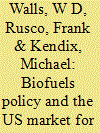| Srl | Item |
| 1 |
ID:
105819


|
|
|
|
|
| Publication |
2011.
|
| Summary/Abstract |
Low ethanol prices relative to the price of gasoline blendstock, and tax credits, have resulted in discretionary blending at wholesale terminals of ethanol into fuel supplies above required levels-a practice known as ethanol splashing in industry parlance. No one knows precisely where or in what volume ethanol is being blended with gasoline and this has important implications for motor fuels markets: Because refiners cannot perfectly predict where ethanol will be blended with finished gasoline by wholesalers, they cannot know when to produce and where to ship a blendstock that when mixed with ethanol at 10% would create the most economically efficient finished motor gasoline that meets engine standards and has comparable evaporative emissions as conventional gasoline without ethanol blending. In contrast to previous empirical analyses of biofuels that have relied on highly aggregated data, our analysis is disaggregated to the level of individual wholesale fuel terminals or racks (of which there are about 350 in the US). We incorporate the price of ethanol as well as the blendstock price to model the wholesaler's decision of whether or not to blend additional ethanol into gasoline at any particular wholesale city-terminal. The empirical analysis illustrates how ethanol and gasoline prices affect ethanol usage, controlling for fuel specifications, blend attributes, and city-terminal-specific effects that, among other things, control for differential costs of delivering ethanol from bio-refinery to wholesale rack.
|
|
|
|
|
|
|
|
|
|
|
|
|
|
|
|
| 2 |
ID:
096716


|
|
|
|
|
| Publication |
2010.
|
| Summary/Abstract |
Our objective in this paper is to quantify the impact of petroleum industry consolidation on refined product prices, controlling for other important factors that could also impact prices. Our empirical analysis focuses on the US petroleum refining industry using data on industry consolidation and wholesale gasoline prices collected over the interval 2000-2008. We match refinery units to wholesale city-terminal gasoline markets, and then estimate pooled cross-section time-series regressions to quantify the impact of petroleum industry consolidation on wholesale gasoline prices at city-specific terminals. The results of the empirical analysis of mergers are mixed, showing that some petroleum industry mergers resulted in statistically significant increases in refined product prices; others resulted in statistically significant declines and still others had no statistical impact at all. Our analysis of the effects of measures of market concentration-one at the level of city-specific wholesale terminals and another at the level of regional spot markets-found evidence that less concentrated markets are associated with lower price levels.
|
|
|
|
|
|
|
|
|
|
|
|
|
|
|
|
| 3 |
ID:
097509


|
|
|
|
|
| Publication |
2010.
|
| Summary/Abstract |
Our objective in this paper is to quantify the impact of petroleum industry consolidation on refined product prices, controlling for other important factors that could also impact prices. Our empirical analysis focuses on the US petroleum refining industry using data on industry consolidation and wholesale gasoline prices collected over the interval 2000-2008. We match refinery units to wholesale city-terminal gasoline markets, and then estimate pooled cross-section time-series regressions to quantify the impact of petroleum industry consolidation on wholesale gasoline prices at city-specific terminals. The results of the empirical analysis of mergers are mixed, showing that some petroleum industry mergers resulted in statistically significant increases in refined product prices; others resulted in statistically significant declines and still others had no statistical impact at all. Our analysis of the effects of measures of market concentration-one at the level of city-specific wholesale terminals and another at the level of regional spot markets-found evidence that less concentrated markets are associated with lower price levels.
|
|
|
|
|
|
|
|
|
|
|
|
|
|
|
|